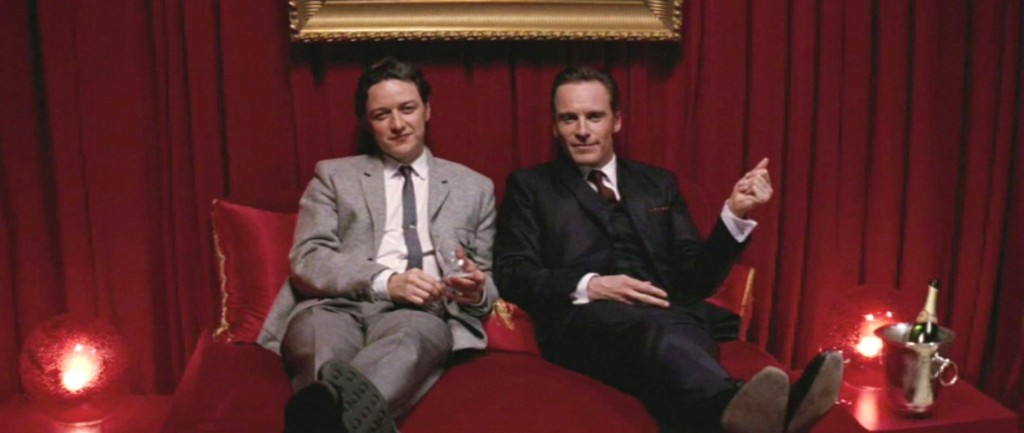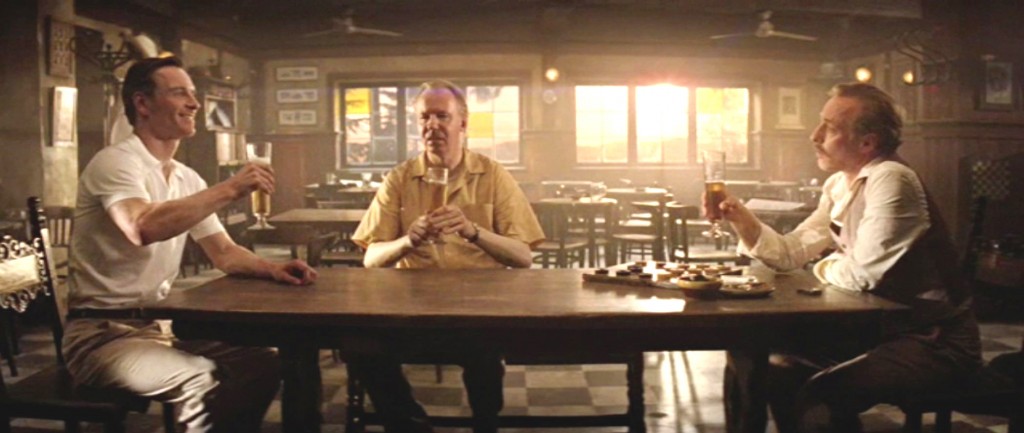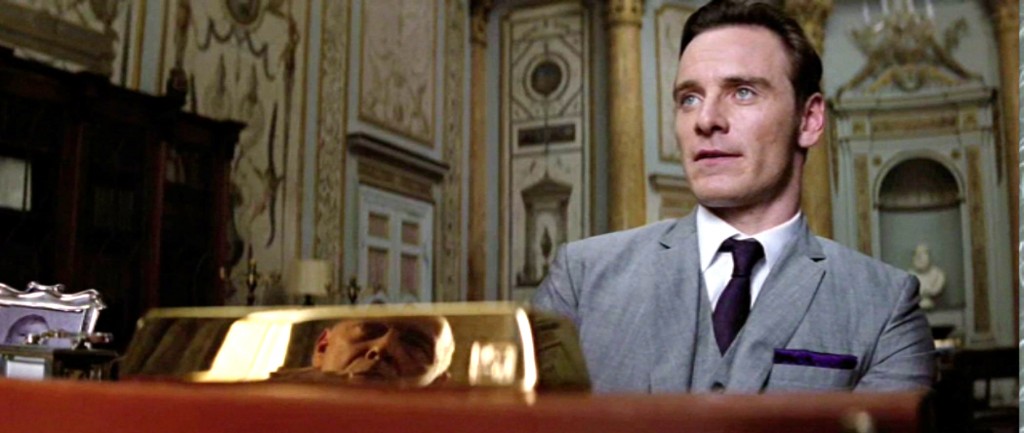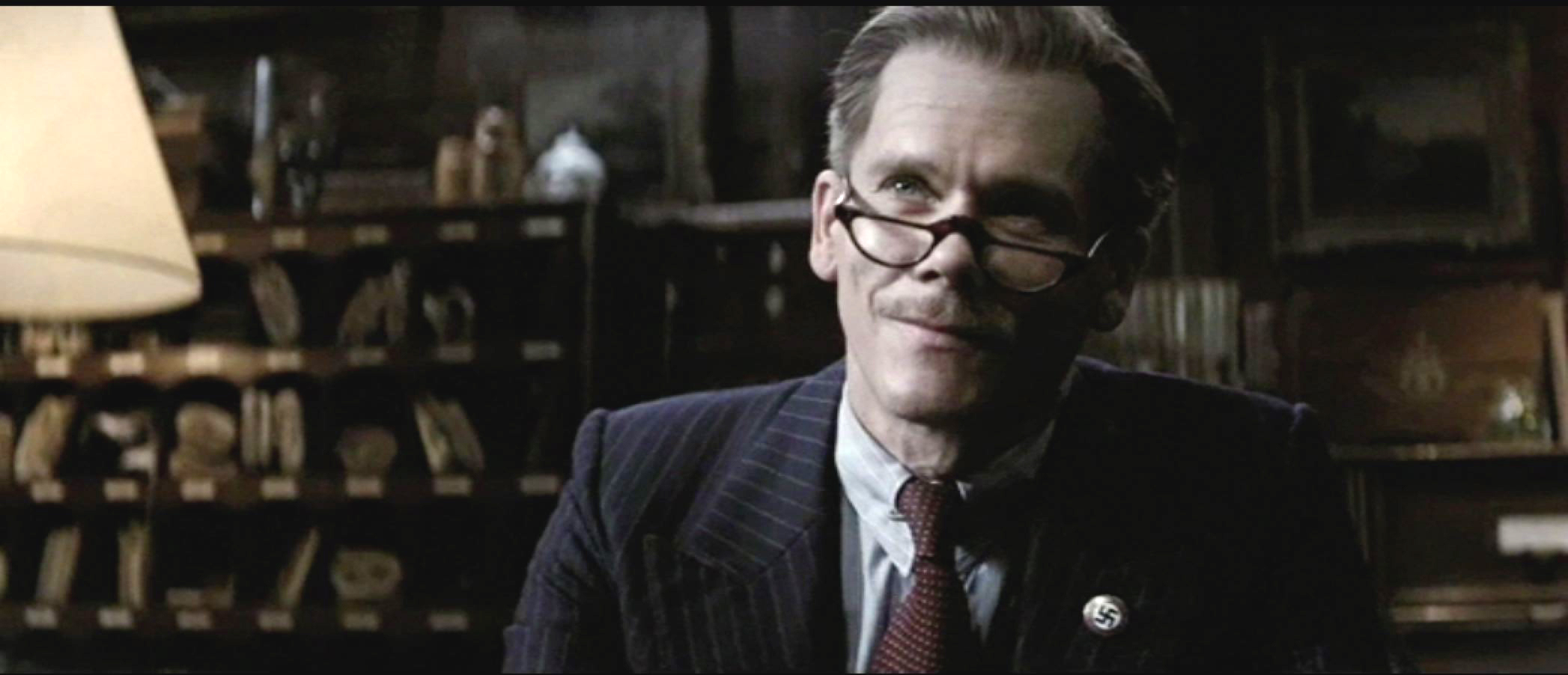X-Men: First Class part 8
The joyous gathering of the new X-men recruits, in the inner sanctum of the MiB HQ, echoes what was happening in college campuses all over the world. It begins with young people discovering themselves, claiming their powers, forging new identities and enjoying their commonality and diversity, and ends with one of them destroying the Establishment leader in effigy. I was struck by the moment of Havok slicing and burning the statue of the MiB (odd that he has a statue of himself on his compound) and trying to remember what it reminded me of. Then I realized, of course, it reminds me of campus protests, where all sorts of unspeakable acts are visited upon the statues of the Great White Men who built the temples of learning but whose relavence had long since vanished. The young recruits are the campus youth movement, the Other gathered in an establishment sanctuary, free from the worries of employment (stripper, cabbie), freed from imprisonment, free to concentrate on “finding themselves,” and, thus, free to concentrate on the next thing. The next thing, in college campuses, is supposed to be “studying,” and here in X-Universe is supposed to be “finding Shaw,” but the end result in both cases is the same: “saving the world.” That’s what the 1960s youth movement, the Hippie Dream, was all about, although, like with the X-Men recruits, “toppling the Establishment” (or at least thumbing one’s nose at it) is the first step in defining themselves. The reason Bob Dylan became the “voice of his generation” was not his politics, it was his refusal to be identified, to be pinned: “Whatever you say I am, that is what I am not.” That strikes at the core of the appeal of X-Men from the beginning, and First Class is not just a history lesson, but an X-Men history lesson. Other movies pay homage (or lip service) to their comics origins, First Class actually puts its comics in historical context and thus illuminates their genuine cultural import.
X-Men: First Class part 7
Erik and Xavier, two straight men in 1962, have fallen in love. Like all straight men who fall in love, they must find things to do together in order to have an excuse to hang out. The manlier the better. Hence, the first thing they do after deciding to work together to find Shaw is to go to a strip club and indulge in some very groovy Mad Men style sexist shenanigans. The joke here being, of course, that they’re not looking for sex but for mutants, in this case a winged young lady named Angel Salvador. Still, the message is clear: like James Bond, Erik and Xavier have found that saving the world doesn’t have to mean you can swing a little. Next, they find a young black cabbie in NYC named Armando Munoz, a imprisoned young man named Alex Summers, an awkward youth with a hyper-sonic voice named Sean Cassidy (not Shaun Cassidy), and, briefly, a taciturn guy named Logan, who, in the movie’s single funniest moment, politely rebuffs their advances. Even Erik and Xavier strike out sometimes, and not everyone wants to join a family.
The team that they assemble are all variations on the Other — a stripper, a black youth, a prisoner, an awkward, rejected teen boy, they’re like the cast of a Bob Dylan song come to life. We’re watching the 1960s come together. Logan, of course, had his ’60s a hundred years earlier, this is not his movement. (I also note that Armando, while black, is not black and angry, just a working-class dude driving a cab, which makes him “other” enough in 1962 New York, no reason to disenfranchise him as well, or make him a stereotype.)
X-Men: First Class part 6
While Shaw is at the North Pole in his submarine, preparing to destroy the world or something, Raven and Hank waste no time in getting to know each other. They bond over their shared desires to appear “normal.” The 1960s are still young, and the postwar conservativism that affected the US, despite the election of Kennedy in 1960, is still very much the order of the day. Perhaps the hippies of San Francisco would accept a boy with hands for feet or a scaly blue young woman, or perhaps they would be accepted at Harvard, where Timothy Leary was beginning his experiments with LSD. (Both Raven and Emma wear miniskirts even though they would not be invented until 1964. Mutants, as always, lead the way in evolution.)
Hank, we learn, has developed a serum that, he believes, will help a mutant maintain his or her abilities while making them appear “normal.” (How this is supposed to work, I have no idea — that’s right, I doubt the veracity of the science of X-Men.) Raven can’t wait to be jabbed by Hank’s needle, so to speak, but Erik comes along to pour cold water on their romantic-scientific tryst. Not only is Erik older and sexier than Hank, he’s prouder and more persuasive than Xavier. When he tells Raven “I wouldn’t change a thing,” it carries more weight than when Xavier says “Mutant and proud,” because Erik has been through the worst a mutant, an Other, can be put through, and come out the other side, while Xavier has never had to suffer a day in his life. Thus, he turns Raven’s head as her one-on-one with Hank suddenly becomes a triangle.
“Urbaniak’s Last Cast” now available at iTunes
“Urbaniak’s Last Cast,” the podcast I wrote for Getting On with James Urbaniak, is now available at iTunes, for those of you who enjoy free podcasts but don’t like to sully your computers with non-Apple services.
X-Men: First Class part 5
Erik, tracking the man he knows as Dr. Schmidt to Miami, surfaces, James-Bond-in-Goldfinger style, in the harbor near Schmidt’s yacht, the one with the boat’s name in Trajan. He climbs aboard the yacht and finds Schmidt (who of course is actually Sebastian Shaw), lounging with Emma Frost and Riptide. Erik has brought a knife, the Nazi dagger he got from the “pig farmer” in Argentina. He is, of course, thinking of the right tool for the job of killing Schmidt — a Nazi dagger reading “Blood and Honor” on the blade, he feels, should carry the right moral heft. He’s wrong in this, and it will take him until the end of the movie to figure out the right tool to use to kill Schmidt.
To Erik, it looks like Schmidt is a callow jet-setter with a bimbo and a manservant, or perhaps a bisexual playboy, but surprise! all three are mutants. Erik gets the full brunt of Emma’s powers — the mind-reading (“He’s here to kill you” she divines, using only her psychic powers, and maybe the fact that Erik has snuck aboard in a black wetsuit and is brandishing a dagger), the diamond-skin, a sonic blast that incapacitates him and, apparently, some telekinetic powers — rather a lot of abilities for one mutant — that blast him overboard. Shaw adds a moral wrinkle to the scene, chastises Emma: “We don’t harm our own kind,” he says, perhaps forgetting about that time he killed Erik’s mother.
Coincidentally, the Coast Guard shows up.
Put on a happy face, again
I’ve written in the past about the phenomenon of studios cheering up the posters for movies when they’re released on DVD. (Here and here.)
A few weeks ago I saw an electronic billboard here in LA for Flight, Bob Zemeckis’s tense drama about alcoholism, but the original poster image had been altered. Star Denzel Washington was no longer standing in the rain on a stormy day, he was now standing in much less rain in front of a blinding blue sky and the quote “FLIGHT SOARS!” blared over his head. I thought, well, for the sake of the quote they want to make the movie look like an inspirational drama, which it is, in a way, so I guess that’s okay.
Now I see that that billboard image was merely a dry run for the DVD cover, and that Flight, the studio had decided, needed some cheering up for the home video market. Pilot Denzel is no longer facing his demons in a storm, now he’s peeking at God as the rain comes to a stop. I’m sure this image is a mock-up, but I like how someone has placed the quote “POWERFUL,” without attribution, below Denzel’s face. I’m sure if Denzel wins the Oscar his expression will be changed to “beaming triumph” and the font will be changed to Trajan.
X-Men: First Class part 4
Moira MacTaggert, temporarily a protagonist and looking for an expert on mutants, travels to Oxford to find Xavier, who has just received his degree. Meanwhile, Erik travels to Argentina to Find Dr. Schmidt, who he doesn’t yet know is really Sebastian Shaw. He comes to a bar that serves German beer and finds a couple of regular patrons who, as luck would have it, are pictured in a photograph up on the wall, with Schmidt, on a boat (a boat with anachronistic Trajan font on its stern). The tables have turned, Nazis are the Other now and these two pals of Schmidt are hiding in South America. Erik reveals himself and kills the two men and the German bartender. One of the men tries to defend himself with a Nazi knife (“Blood and Honor” it says on its blade) while the bartender approaches with a Luger, the Nazi pistol of choice. Even though Erik went in to get information about Schmidt, he got none from the men himself — he learned everything he needs to know from the boat photo with the anachronistic font. He kills two of the men in self-defense and one out of vengeance. Or, since he has control over all the metal objects in the room, he kills them all out of vengeance. The one with the knife gives the old Nazi excuse of “We were only following orders,” an expression that was hugely popular among escaped Nazis at the time: Adolf Eichmann had just been captured in Argentina and was tried in Jerusalem in the spring of 1962 and used the “only following orders” defense as his excuse. Eichmann had just been executed at the time this scene takes place, the knife-wielder’s use of the quote could not have been more germane, or more ill-timed to garner sympathy from Erik.
X-Men: First Class part 3
The grown-up Erik Lehnsherr has traveled to Switzerland, like Jason Bourne, to find something. Bourne was looking for himself, but Erik is looking for Dr. Schmidt, the Nazi doctor who wasn’t really a Nazi doctor, who mentored him and developed his metal-manipulation powers during WWII.
Erik has gotten into the bank by pretending to be a client with a bar of Nazi gold. The screenplay doesn’t indicate where he got this bar of gold, but he does mention that “it’s all that’s left of my people.” Did Erik, under orders from Schmidt, extract this gold from the teeth of Jews in Schmidt’s prison camp, remove jewelry hidden on their persons? He doesn’t say, but we shortly see him do both those things to the Swiss banker who resists giving up Schmidt’s current location. Erik says he’d like to kill the banker, since the banker apparently has plenty of ex-Nazi clients, but he stops at merely removing one of his fillings. We will see later that Erik has no trouble killing Nazis, why does he demur at the opportunity to kill the banker? Perhaps he’s worried the murder of a banker would draw undue attention to him. In any case, the banker gives Erik Schmidt’s current location (Argentina, the ex-Nazi’s favorite hiding place).
X-Men: First Class part 2
We’ve met our rich-boy, poor-boy leads, and our story will turn out to be a romance between them. Because X-Men: First Class is a love story, it is allowed two protagonists. Generally speaking, a love story is weighted in the favor of one participant or the other, but First Class‘s seems genuinely evenly-balanced. So, if we have our two protagonists, the question immediately rises: what do the protagonists want? Erik’s desire is clear, and stems from privation: he wants his mother back. Xavier’s desire, on the other hand, stems from comfort and plenty: he wants all those who are unusual to feel safe and welcome. (It’s an interesting question how safe Xavier feels in his estate, if his mother is cold and distant.)
But before we get to the love story we need to meet our primary antagonist, Dr. Klaus Schmidt. Dr. Schmidt, before he even sits down to speak to Erik, tells us that he is “not a Nazi.” He listens to Edith Piaf, pooh-poohs the Nazi goals of blond hair and blue eyes and offers Erik chocolate. He’s playing “good cop,” and in fact is positioning himself as Erik’s new father in this wartime drama. It takes a special kind of man to pretend to be a Nazi to the extent Schmidt does, and we will learn more about that later.











